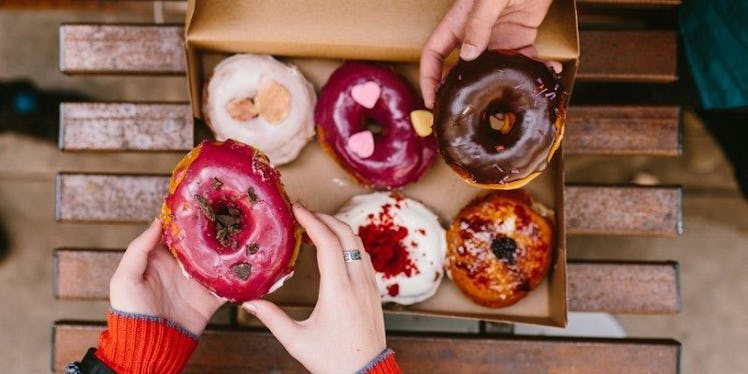
Here's How To Build Up The Willpower You Need To Lose Weight
OK, so summer is something like six weeks away. You have a bit of weight to lose (damn those late-night taco runs), and you're summoning all your willpower to do so.
Unfortunately, it's not going so well.
Your day looks something like this: You wake up, throw a banana, kale and almond milk in your blender and drink up. You feel great about yourself.
As soon as you get to the office, you're greeted by the smell of fresh bagels. Yep, today's free bagel day, but you won't give in. You have your eye on the prize. Plus, you're still full from your super nutritious breakfast.
Around 1 pm, you dig into the veggie stir-fry you prepared the night before. It's delicious. This is easy. Four weeks from now, you will literally look exactly like Gigi Hadid.
Things start to get a little rougher as the afternoon wears on. You're exhausted because you stayed up way too late watching "House of Cards." Your co-worker makes a passive-aggressive comment, and then your boss snaps at you for making a small mistake.
A kind co-worker offers you a chocolate chip cookie, and you graciously take it. You're tired. Maybe the sugar will perk you up. Plus, you deserve this cookie -- your day has been hard!
Then, you get home. You have all the ingredients for a delicious dinner of salmon, spinach and quinoa, but you are so done with today. You log in to your Seamless account, order a cheeseburger and top it with an entire bag of Tate's cookies (hey, at least they're gluten-free).
This is based off of personal experience, so if you think I'm crazy, I give you full permission to judge me and stop reading this right now. But, if it sounds at all familiar, we need to talk about willpower.
Willpower is a muscle.
The day after running a half marathon, I'm going to guess your legs aren't exactly dying to do it again. This is because your legs are very tired, and they need a little bit of time to recover.
This is basically how willpower works. Say you try to cut out sugar. At first, you're full of willpower. You don't even want that doughnut, not even a little bit. It gets a little harder as the day wears on, but it's not impossible.
A week later, it's not quite as easy. You're over the initial rush, and the muscle that is your willpower is completely exhausted.
You're pretty good about avoiding sugar first thing in the morning, especially if you had a good night's sleep. But by 10 pm, after a stressful day, all you want is that damn cupcake your SO brought home because he or she thought it would make you happy.
As Charles Duhigg explains in his book "The Power of Habit,"
Willpower isn't just a skill. It's a muscle, like the muscles in your arms or legs, and it gets tired as it works harder, so there's less power left over for other things.
If the only thing you had to use your willpower for was eating healthy and avoiding junk food, you'd probably be fine. But we literally use our willpower all day long to get through difficult tasks at work, run errands and deal with minor life annoyances.
So, sadly, willpower isn't all that reliable when it comes to sticking to your diet.
But, there is something you can do.
In her own examination of habits, Gretchen Rubin, author of "The Happiness Project" and "Better Than Before," notes you can preserve more of your willpower by developing strong habits around what she calls the "Essential Seven."
Rubin suggests making a habit out of eating and drinking healthfully, exercising regularly, spending money wisely, getting enough rest, not procrastinating, keeping you environment simple and organized and engaging deeply with people.
Although it takes willpower to develop these habits in the first place, once those habits are strongly in place, you don't have to rely on willpower to keep them up.
In a blog post, Rubin wrote,
We can use decision-making to choose the habits we want to form, use willpower to get the habit started, then -- and this is the best part -- we can allow the extraordinary power of habit to take over. At that point, we're free from the need to decide and the need to use willpower. We take our hands off the wheel of decision, and our foot off the gas of willpower, and rely on the cruise-control of habits. Mindfully, then mindlessly.
So, there you go. Relying on willpower alone will probably backfire on you, but if you turn what once required willpower into a habit, that's where the magic happens.
Plus, it'll be a lot harder to deplete your willpower if you're taking awesome care of yourself. So if you try to do something really f*cking hard, like give up sugar (I wish you luck), your willpower muscle won't get exhausted quite as quickly.